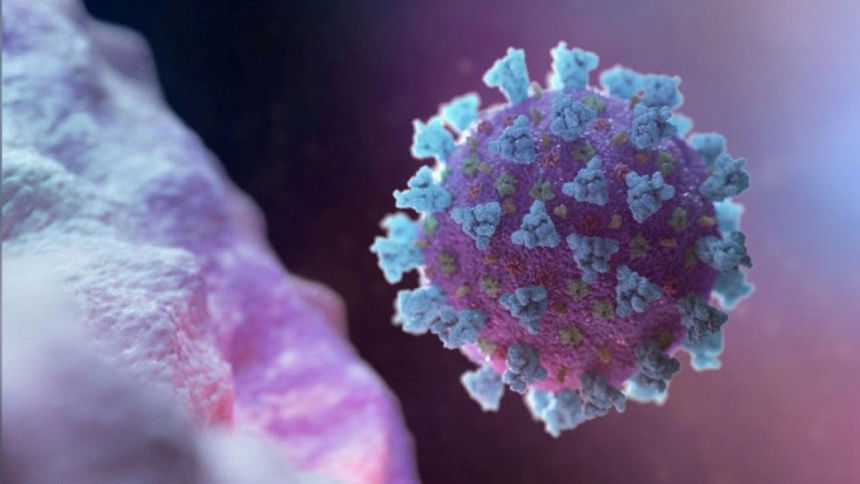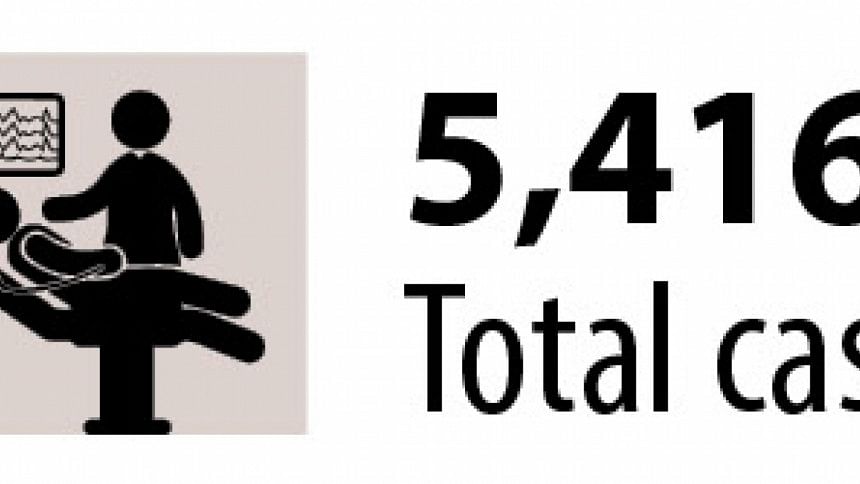Hidden cases now spreading virus


Shafiul Alam, a worker at a garment factory in coronavirus-hit Gazipur, returned to his village home in Pirojpur's Bhandaria upazila on April 15.
Though he didn't have any Covid-19 symptoms, the upazila administration asked him to remain in home quarantine as a precaution and had him tested for the virus on April 22. The test results came positive.
"I still have no symptoms… I don't feel unwell. Upon my return from Gazipur, I have been in isolation in one of the rooms in my house," Shafiul (not his real name) told this newspaper over the phone on Friday.
Including him, six of the seven people who tested positive for the virus in Pirojpur till April 24 had no symptoms, Md Hasnat Yusuf Zaki, civil surgeon in the district, told The Daily Star.
Similarly, four members of a family in Tangail and two relatives of a virus-infected doctor in Brahmanbaria tested positive for the virus, but did not show any symptoms.
Of the 5,416 coronavirus cases detected till yesterday, 1,250 didn't have any symptoms, according to official data.
Experts see it as an indication of a big number of hidden cases who are silently transmitting the deadly virus across the country.
An official of the Institute of Epidemiology, Disease Control and Research (IEDCR), shared a similar view.
"The IEDCR is conducting tests very selectively, mostly on those who have symptoms ... It doesn't reflect the real picture as we are not carrying out enough tests," the official told The Daily Star yesterday, seeking anonymity.
Since January 28, all the 22 labs -- 10 in the capital and 12 outside -- assigned for testing suspected Covid-19 cases have tested 46,589 samples for the virus.
Asked, IEDCR Director Meerjady Sabrina Flora claimed that the number of asymptomatic patients would not be huge.
"We found 23 percent of all the Covid-19 cases asymptomatic," she told this newspaper yesterday.
Recently, eight IEDCR staffers tested positive for the virus but none of them had any symptoms.
"The IEDCR staffers have regular checkups as we deal with patients. None of the eight staffers showed any Covid-19 symptoms before the tests," said a doctor at the IEDCR, seeking anonymity.
Of them, six have already recovered without showing any signs of the disease while the other two are receiving treatment at the Infectious Diseases Hospital in the capital.
The doctor also mentioned a recent study by the Indian Council of Medical Research, which said 80 percent of the Covid-19 patients in India are asymptomatic.
"The number of such asymptomatic patients in Bangladesh could also be high," added the physician.
Recently, 25 staffers of a private hospital in the capital's Panthapath tested positive for the virus and none of them had any symptoms. Besides, 28 devotees at the Iskcon temple in Swamibagh, who got infected with the virus, didn't show any symptoms.
WHAT EXPERTS SAY
Prof Ridwanur Rahman, a specialist in medicine and infectious diseases, termed the recent detection of asymptomatic cases "the tip of the iceberg".
"It is a proof of our assumption that there are many undetected cases. It is tougher to control virus transmission at this stage. The virus is being spread mostly by those carriers who are not approaching the authorities for tests.
"Since we are not carrying out enough tests, we don't have the real picture. What we are seeing is just the tip of the iceberg. It's not possible to reach any conclusion based on the existing data."
Contacted, former DGHS Director General Prof Shah Monir Hossain, assigned by the DGHS to advise on controlling and preventing Covid-19 in Dhaka region, said there are many asymptomatic cases across the country.
"We have now reached the fourth stage of virus transmission. This means community transmission is there. At this stage, it is essential to test the suspected cases and also those who came into contact with Covid-19 patients.
According to the Directorate General of Health Services (DGHS), the fourth stage refers to the highest level of transmission, and in this phase, community transmission happens in many areas of the country at the same time.
Prof Monir said, "A number of asymptomatic cases, who came into contact with Covid-19 patients, are being tested for the virus as part of the government's contact tracing activities across the country. Any asymptomatic carrier of the virus may develop symptoms a few days later. It is because of the incubation period.
"As per our epidemiological prediction, the number of positive cases will keep increasing in the next two weeks. Then it will begin to fall.
"But we are worried because our country is a densely populated one. If virus transmission happens among the low socio-economic groups [such as slum dwellers], the situation may worsen," he pointed out.
The Covid-19 is transmitted mainly through respiratory droplets expelled by someone who is coughing or has other symptoms such as fever or tiredness. Many of those infected with the virus don't show any symptoms.
This is particularly true at the early stages of the disease. It is possible to contract the virus from someone who has just a mild cough and does not feel ill.
Some reports have indicated that people with no symptoms can transmit the virus. It is still unknown how often it happens.


 For all latest news, follow The Daily Star's Google News channel.
For all latest news, follow The Daily Star's Google News channel. 



Comments